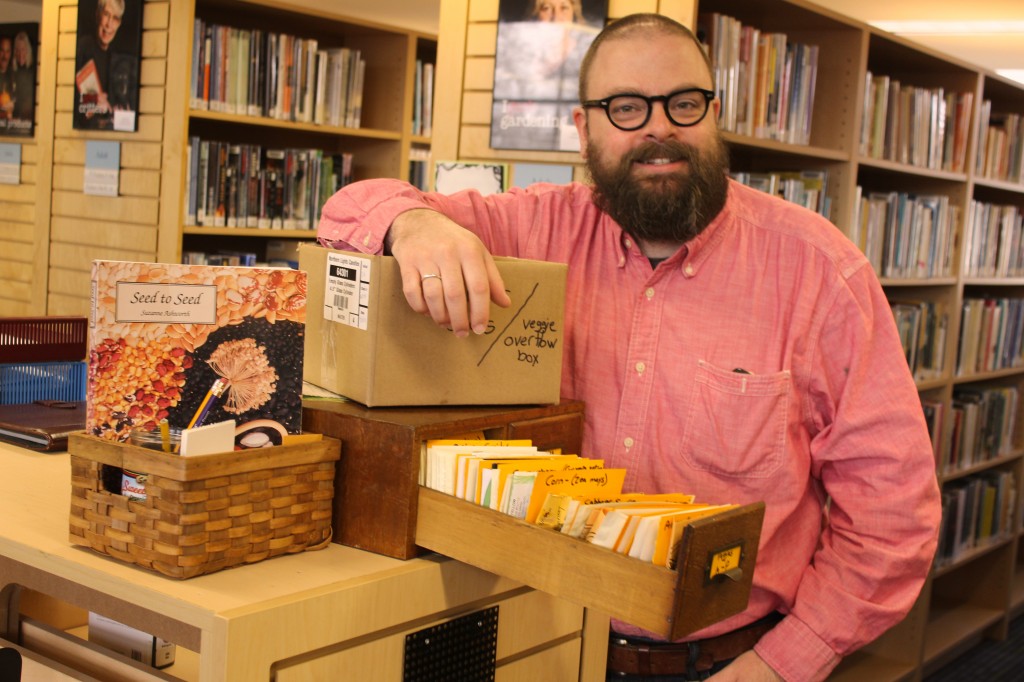NEW Seed Library in Manchester
If you are a gardener, you know that planting season is just around the corner. And while the hardware store is a great source and seed catalogs provide an endless selection, you now have another choice. Manchester’s Seed Library is open for business!
Seed libraries are growing in number across the country. Building on the idea of a seed swap, a seed library is a community resource that allows seeds to be exchanged by users in a permanent location, at any time. Manchester’s seed library is a joint effort of the Manchester Community Garden Committee and the Manchester District Library, which is where it’s located. Everyone will be able to use it whenever the library is open, year-round, whether or not they have library cards.
Currently the seed library consists of a wooden box with 2 drawers on the counter behind the circulation desk. It is full of seed packets, new and partially used, organized by seed type. Patrons can look through it and if they find seeds they will plant, they can take the whole packet, or, if they think they will plant fewer, they can pour some out into one of the empty envelopes next to the seed library and take just the ones they will use. This is considered “checking out seeds”.
The seed library is looking for donations of unopened or partially used seed packets. They can be brought in and filed in the correct sections. The only thing donors need to do is make sure that the year the seeds were grown for (or purchased) is stamped or hand-written on the envelope. The policy is that only seeds from the the last 5 years (except from plants in the cabbage family, which can be up to 10 years old) will be accepted. Seeds that are too old are much less likely to germinate.
The seed “library” metaphor works because although one of the goals of the seed library is get free seeds to Manchester residents, patrons are asked to consider “returning seeds” for the next growing season. This is done through seed saving. Saving seeds can range from very simple to very complicated depending on the type of plant, but the basic idea is that you collect seeds from some of the plants that you grow, dry them and plant them next year (or, in this case, donate some of the seeds to the seed library).
Tomatoes, peppers, peas and beans are easy plants to start with. All you have to do is let a few beans and pea pods stay on the vine past ripe, until they dry up and turn brown, then you remove the seeds and they are ready for next year’s planting. Pepper seeds need to be harvested from peppers that have gone a little beyond ripe and have started to wrinkle. Tomato seeds can be collected from ripe tomatoes and dried. These plants all self pollinate with little risk of cross pollination by insects. Wind pollinated and insect pollinated plants are a little more complicated, but there are many good resources out there that explain how to do it. The Manchester Seed Library has a reference book “Seed to Seed” by Susanne Ashworth that can be consulted at any time and explains everything you need to know about saving almost any type of vegetable seed.
Seeds should only be saved from non-hybrid varieties (usually designated as “open-pollinated” or “heirloom”). Seeds saved from F-1 hybrid varieties will not produce plants exactly like the parent plant. Almost all of the seeds currently in the seed library are open-pollinated varieties and can be saved. In fact, the seed library has been stocked with many new seed packets of heirloom varieties donated by Jennifer Fairfield of the Garden Mill in Chelsea.
Seed saving is a traditional practice and it is only within the last century or so that US farmers started buying all of their seeds from commercial growers. Before this change, thousands of varieties of plants were grown all over the country. Now 75% of the vegetables seeds are produced by 5 multinational corporations. Many varieties only have 1 source and if that corporation decided to stop growing it, it disappears forever and the genetic pool shrinks. Seed saving gives us the tools to preserve varieties from extinction.
The mission statement of the seed library is “To help support and grow our community of gardeners, from beginners to experts, by providing access to free seeds, and to encourage seed-saving.” If you have questions about the seed library, email Sara Swanson (me) at sara@frogfuz.com.









You must be logged in to post a comment Login